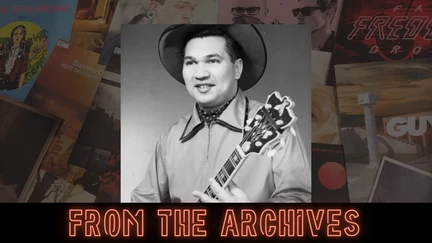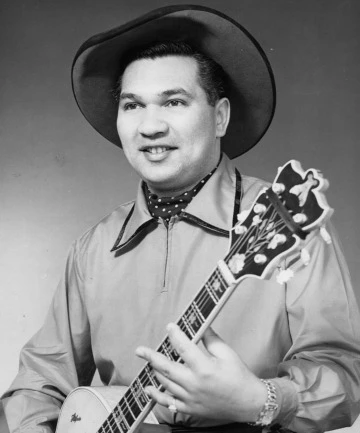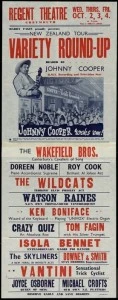Johnny Cooper, 'The Māori Cowboy'
Johnny Cooper, hero of early New Zealand rock’n’roll, died earlier this month in Lower Hutt, aged 85.


Johnny Cooper in the early 1950s.
Source: Alexander Turnbull Library, Ref: PAColl-10069-18-08
Born in 1929, Cooper grew up on an isolated farm near Wairoa. He was gifted a ukulele by his uncle, who played saxophone in a Gisborne dance band. He began playing along to 78s, and would play in woolsheds to entertain the shearing gangs.
Cooper won a scholarship to attend Hawkes Bay’s illustrious Te Aute college. After attending for a time, Cooper was desperate to leave. However, his elders were insistent that he stay in school. So Cooper boarded the train to return to school from Wairoa, and instead stayed on-board and ran away to Wellington. This resulted in Cooper being disowned by his parents: “They said, you’re on your own.”
Cooper stayed in a boarding house and got a job at Karori cemetery. On Sunday nights he sang at cinemas and suburban halls. He dug graves during the day, and met bass-player Willy Lloyd-Jones. In 1953 they formed The Ridge Riders with guitarist Ron James and Don Aldridge on steel. The group wore cowboy style outfits and became known at talent quests and live shows on radio, with appearances in Wanganui and at Linton and Waiouru.
On Sundays they recorded in Alan Dunnage’s Island Bay studio, inside an old shop. A duet by Cooper became the number one 78 of 1954; Look What You’ve Done produced a double-sided hit. Cooper had written most of the song in a day: “I heard someone say ‘look what you’ve done’ and thought that was a crazy thing to say, that it would be good to sing something like that.” The song became a continual request for The Ridge Riders: “Shearing shed or anywhere, every party you went to in that period that was all you heard them play.” The song became a well-known Kiwi party song and was famously sung by Jake and Beth Heke in ‘Once Were Warriors’.
In 1955 Cooper started a solo career in rock’n’roll at town hall jamborees. He made New Zealand music history by becoming the first singer outside of the United States to record a rock’n’roll song when he recorded Rock Around the Clock with a group of Wellington jazz men at HMV’s Lower Hutt studios in 1955. As a country singer, Cooper had originally balked at the idea of recording a rock’n’roll track, and had said “What’s this rubbish? I’m not singing that.” Within a year Cooper was touted as the “undisputed king of rock’n’roll whose record sales are now far in excess of a hundred thousand.” Cooper also recorded New Zealand’s first original rock’n’roll song, Pie Cart Rock’n’Roll in 1955.

Ref: Eph-E-CABOT-Variety-1957-01. Alexander Turnbull Library, Wellington, New Zealand. http://natlib.govt.nz/records/22699643
F W Larcombe Ltd. Harry Fagin proudly presents New Zealand tour Variety round up, headed by Johnny Cooper, H.M.V. recording and television star. Johnny Cooper rocks 'em! Regent Theatre Greymouth, Wed Thurs Fri Oct 2, 3, 4. Larcombe Print [1957]. [Posters collected by Charles Cabot, for variety, comedy, and music-hall shows and performances in New Zealand. 1950-1959]..
Cooper’s musical talent saw him travel around the world, leading three concert tours during the 1950s to entertain Kiwi troops in Japan and Korea.
In 1957, The Ridge Riders drifted apart and Cooper started holding talent shows around small towns, including Give It A Go! Through this, he coached some of New Zealand music’s well-known names, including rock’n’roll idol Johnny Devlin, Midge Marsden (who played in Bari and the Breakaways) and the Formulya, whose song Nature was to be judged the greatest New Zealand rock song of all time.
Cooper moved into entertainment promotion in the 1960s. Good friend and fellow musician Midge Marsden says he did not so much fall from the limelight as ease himself into the shadows. “His private life was exactly that – private.”
Cooper, who was suffering from Alzheimer’s disease, died at his home early in September.
Neighbours of Johnny Cooper knew him as a friendly pillar of the community, who tidied the area and mowed lawns for free. Friends knew him as a warm, modest and humble man, and hold many fond memories.
Here are some items in our collection that mentions Johnny Cooper or have his songs recorded: